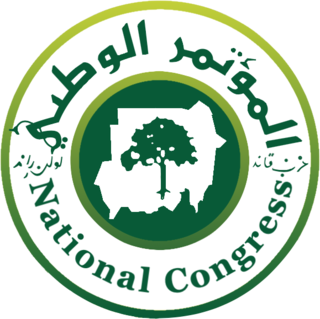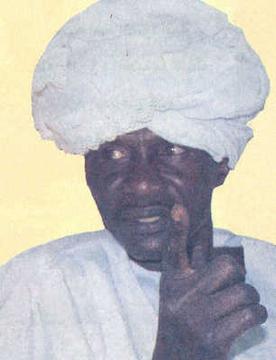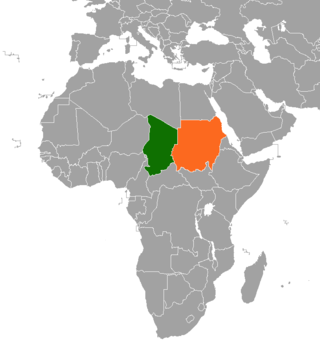| |||||
| Decades: | |||||
|---|---|---|---|---|---|
| See also: | Other events of 2007 History of Sudan | ||||
The following lists events that happened during 2007 in Sudan .
| |||||
| Decades: | |||||
|---|---|---|---|---|---|
| See also: | Other events of 2007 History of Sudan | ||||
The following lists events that happened during 2007 in Sudan .

Omar Hassan Ahmad al-Bashir is a Sudanese former military officer and politician who served as Sudan's head of state under various titles from 1989 until 2019, when he was deposed in a coup d'état. He was subsequently incarcerated, tried and convicted on multiple corruption charges. He came to power in 1989 when, as a brigadier general in the Sudanese Army, he led a group of officers in a military coup that ousted the democratically elected government of prime minister Sadiq al-Mahdi after it began negotiations with rebels in the south; he subsequently replaced President Ahmed al-Mirghani as head of state. He was elected three times as president in elections that have been under scrutiny for electoral fraud. In 1992, al-Bashir founded the National Congress Party, which remained the dominant political party in the country until 2019. In March 2009, al-Bashir became the first sitting head of state to be indicted by the International Criminal Court (ICC), for allegedly directing a campaign of mass killing, rape, and pillage against civilians in Darfur. On 11 February 2020, the Government of Sudan announced that it had agreed to hand over al-Bashir to the ICC for trial.

Darfur is a region of western Sudan. Dār is an Arabic word meaning "home [of]" – the region was named Dardaju while ruled by the Daju, who migrated from Meroë c. 350 AD, and it was renamed Dartunjur when the Tunjur ruled the area. Darfur was an independent sultanate for several hundred years until 1874, when it fell to the Sudanese warlord Rabih az-Zubayr. The region was later invaded and incorporated into Sudan by Anglo-Egyptian forces in 1916. As an administrative region, Darfur is divided into five federal states: Central Darfur, East Darfur, North Darfur, South Darfur and West Darfur. Because of the War in Darfur between Sudanese government forces and the indigenous population, the region has been in a state of humanitarian emergency and genocide since 2003. The factors include religious and ethnic rivalry, and the rivalry between farmers and herders.

The National Congress Party was a major political party of ousted President Omar Al-Bashir, it dominated domestic politics in Sudan from its foundation until it was dissolved following the Sudanese Revolution.

The Sudan Liberation Movement/Army is a Sudanese rebel group active in Darfur, Sudan. It was founded as the Darfur Liberation Front by members of three indigenous ethnic groups in Darfur: the Fur, the Zaghawa, and the Masalit, among whom were the leaders Abdul Wahid al-Nur of the Fur, Khamis Abakar of the Masalit and Minni Minnawi of the Zaghawa.

This article covers the period of the history of Sudan between 1985 and 2019 when the Sudanese Defense Minister Abdel Rahman Swar al-Dahab seized power from Sudanese President Gaafar Nimeiry in the 1985 Sudanese coup d'état. Not long after, Lieutenant General Omar al-Bashir, backed by an Islamist political party, the National Islamic Front, overthrew the short lived government in a coup in 1989 where he ruled as President until his fall in April 2019. During Bashir's rule, also referred to as Bashirist Sudan, or as they called themselves the al-Ingaz regime, he was re-elected three times while overseeing the independence of South Sudan in 2011. His regime was criticized for human rights abuses, atrocities and genocide in Darfur and allegations of harboring and supporting terrorist groups in the region while being subjected to United Nations sanctions beginning in 1995, resulting in Sudan's isolation as an international pariah.

The Chadian Civil War of 2005–2010 began on December 18, 2005. Since its independence from France in 1960, Chad has been swamped by civil wars between the Arab-Muslims of the north and the Sub-Saharan-Christians of the south. As a result, leadership and presidency in Chad drifted back and forth between the Christian southerners and Muslim northerners. When one side was in power, the other side usually started a revolutionary war to counter it.
The United Front for Democratic Change was a Chadian rebel alliance, made up of eight individual rebel groups, all with the goals of overthrowing the government of Chadian president Idriss Déby. It is now part of the Union of Forces for Democracy and Development. UFDC was founded between 26–28 December 2005 in Modeina in eastern Chad. FUC's "president" is Mahamat Nour Abdelkerim, the former leader of the Rally for Democracy and Liberty rebel group, "first vice president" Hassan Salleh Algadam, "second vice president" Abakar Tollimi, and "secretary-general" Abdelwahit About. On 18 December the RDL and another allied rebel group, Platform for Change, Unity and Democracy, attacked the city of Adré. The attack was repulsed by the Chadian military, and the Chadian government accused the Sudanese government of supporting the rebels, which Sudanese President Omar al-Bashir denies. Chad declared a "state of belligerance" with Sudan on 23 December 2005, resulting in the Chad-Sudan Conflict. The result was the Tripoli Agreement.

The War in Darfur, also nicknamed the Land Cruiser War, was a major armed conflict in the Darfur region of Sudan that began in February 2003 when the Sudan Liberation Movement (SLM) and the Justice and Equality Movement (JEM) rebel groups began fighting against the government of Sudan, which they accused of oppressing Darfur's non-Arab population. The government responded to attacks by carrying out a campaign of ethnic cleansing against Darfur's non-Arabs. This resulted in the death of hundreds of thousands of civilians and the indictment of Sudan's president, Omar al-Bashir, for genocide, war crimes, and crimes against humanity by the International Criminal Court.

While there is a consensus in the international community that ethnic groups have been targeted in Darfur and that crimes against humanity have therefore occurred, there has been debate in some quarters about whether genocide has taken place there. In May 2006, the International Commission of Inquiry on Darfur organized by United Nations "concluded that the Government of the Sudan has not pursued a policy of genocide ... [though] international offences such as the crimes against humanity and war crimes that have been committed in Darfur may be more serious and heinous than genocide." Eric Reeves, a researcher and frequent commentator on Darfur, has questioned the methodology of the commission's report.

Air West Flight 612 was a scheduled domestic passenger flight operated by Air West between Khartoum and Al-Fashir, both in Sudan. On January 24, 2007, with 103 people on board, the flight, operated by a Boeing 737, was hijacked shortly after takeoff by a male individual. The plane landed safely at N'Djamena, Chad, where the hijacker surrendered.

Ali Muhammad Ali Abd-Al-Rahman, commonly known as Ali Kushayb, is a senior Janjaweed commander who supported the Sudanese government against Darfur rebel groups during the Omar al-Bashir presidency. He was indicted by the International Criminal Court (ICC) for war crimes. He was known as aqid al oqada and was active in Wadi Salih, West Darfur.
Events from the year 2007 in Chad.
General Mahamat Nouri is a Chadian insurgent leader who currently commands the Union of Forces for Democracy and Development (UFDD). A Muslim from northern Chad, he began his career as a FROLINAT rebel, and when the group's Second Army split in 1976 he sided with his kinsman Hissène Habré. As Habré's associate he obtained in 1978 the first of the many ministerial positions in his career, becoming Interior Minister in a coalition government. When Habré reached the presidency in 1982, Nouri was by his side and played an important role in the regime.
The Battle of N'Djamena began on February 2, 2008, when Chadian rebel forces opposed to Chadian President Idriss Déby entered N'Djamena, the capital of Chad, after a three-day advance through the country. The rebels were initially successful, taking a large part of the city and attacking the heavily defended presidential palace. They did not capture the palace, and after two days of fighting they withdrew to outside the city. Around two days later they retreated east.

The populations of eastern Chad and western Sudan established social and religious ties long before either nation's independence, and these remained strong despite disputes between governments. In recent times, relations have been strained due to the conflict in Darfur and a civil war in Chad, which both governments accuse the other of supporting.

In May 2008, the Justice and Equality Movement (JEM), a Darfur ethnic minority rebel group, undertook a raid against the Sudanese government in the cities of Omdurman and Khartoum.

United Nations Security Council resolution 1556, adopted on 30 July 2004, after recalling resolutions 1502 (2003) and 1547 (2004) on the situation in Sudan, the council demanded that the Sudanese government disarm the Janjaweed militia and bring to justice those who had committed violations of human rights and international humanitarian law in Darfur.
The following lists events that happened during 2006 in Sudan.

The Darfur genocide was the systematic killing of ethnic Darfuri people during the War in Darfur. The genocide, which was carried out against the Fur, Masalit and Zaghawa ethnic groups, led the International Criminal Court (ICC) to indict several people for crimes against humanity, rape, forced transfer and torture. An estimated 200,000 people were killed between 2003 and 2005. Other sources estimate that between 2003 and 2008, the conflict resulted in about 300,000 civilian deaths and about 2.7 million displaced civilians.
The following lists events that happened during 2020 in Sudan.